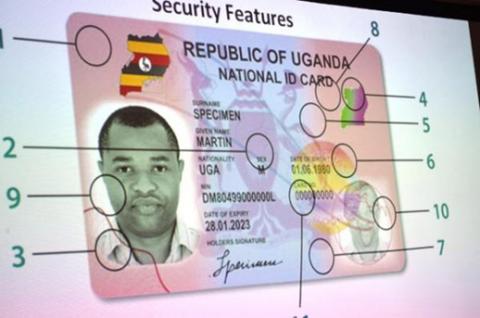The National Identification and Registration Authority (NIRA) is facing a wave of unease amid reports suggesting a covert move to merge the organization with the Directorate of Citizenship and Immigration Control (DCIC). If implemented, this merger would birth a new entity termed the National Citizenship and Registration Services.
The alarm was sounded after revelations that a group of high-ranking officials within NIRA and the Ministry of Internal Affairs are purportedly advocating for this merger. The envisioned move has sparked concerns about the independence of NIRA, particularly in light of a Cabinet decision during last year’s government body mergers. The Cabinet had then decided that NIRA should maintain its autonomy, acquiring an expanded role in registering births, marriages, and deaths of citizens, a responsibility previously handled by the Uganda Registration Services Bureau.
A meeting held on January 24 at the Ministry of Internal Affairs, involving key figures such as Lt Gen Joseph Musanyufu and Brig Stephen Kwiringira, Deputy NIRA Executive Director, allegedly aimed at discussing the potential merger of bodies under the Ministry. While Simon Mundeyi, the spokesperson for the Internal Affairs Ministry, acknowledged the meeting, he denied any covert plans to merge NIRA with DCIC. According to Mundeyi, the meeting primarily focused on discussions about NIRA’s functionality, particularly regarding additional responsibilities related to registering foreigners.

However, concerns have been raised regarding past discrepancies, such as the issuance of national IDs to individuals from countries, like Pakistan, that do not allow dual citizenship. Mundeyi acknowledged past mistakes, citing instances where letters from the late Honorary Consul of Pakistan, Mr. Katatumba, recommended some Pakistanis for national IDs, inappropriately asserting that Pakistan permitted dual citizenship. Subsequent clarifications from the Pakistan Embassy rectified the error, confirming that they do not allow dual citizenship. In response, Mundeyi emphasized that the Ministry has become stringent, scrutinizing the law and verifying the aliens’ country of origin before issuing certificates.
Despite these clarifications, questions persist over the potential merging of NIRA with DCIC. NIRA Deputy Executive Director, Brig Stephen Kwiringira, stated that he is unaware of any plans for such a merger, emphasizing that the Cabinet’s agenda cannot be determined by discussions at levels lower than the Cabinet itself.
As these discussions unfold, the fate of NIRA remains uncertain, with stakeholders closely monitoring developments amid the evolving landscape of Uganda’s identification and registration authorities.
NIRA Contracts with other organizations
Sources have also disclosed allegations of internal maneuvering within the Ministry of Internal Affairs, where officials purportedly supported two companies, Muehlbauer and Mossip, in a multi-billion shilling deal to supply software and ICT accessories for NIRA. Unsuccessful in their endeavors, these officials are now rumored to be pushing for the merger with DCIC to potentially influence a new procurement process managed by the Internal Security Organization (ISO).

The deal to process national IDs was awarded to Uganda Security Printing Company (USPC), a joint venture with the government. However, concerns arise that regaining the mandate of processing national IDs would not only grant Internal Affairs Ministry officials access to significant funds for the project but also potentially cover up illegal activities.
NIRA has allocated a budget of Shs 666 billion for the 2024/25 financial year for the implementation of the mass registration and renewal of national identity cards, expiring in August 2024. As the controversy unfolds, stakeholders closely monitor the situation amid the evolving of Uganda’s identification and registration authorities.
The National Identification and Registration Authority (NIRA) in Uganda is reportedly encountering challenges in its mass enrollment and renewal project, with concerns arising over a significant increase in costs for procuring biometric kits. NIRA is said to be acquiring 5,500 kits for the project, with the total cost surging from an initial estimate of Shs 121 billion to a staggering Shs 148.5 billion.
Originally priced at Shs 17 million per kit, the cost has now been raised to Shs 22 million per kit, resulting in the substantial escalation of the overall procurement expenditure. Comparatively, in Ethiopia, the government is acquiring biometric kits at $3,000 (Shs 10 million) each for its national ID project.
NIRA recently announced its intention to incorporate iris biometrics into the new ID card, which will also serve as a travel document within the East Africa Region. The card is set to feature advanced security measures to ensure robust ID verification and authentication without compromising personal data.
According to NIRA’s regulations, individuals holding expiring national IDs are required to apply for renewal using Form 9 at least two months before the card’s expiry. This implies that by June, NIRA should have commenced the processing of IDs for the 17.4 million unregistered Ugandans and the renewal of identity cards for the 25.9 million already registered individuals.
As the mass enrollment and renewal project unfolds, the challenges faced by NIRA, particularly the cost escalation, raise questions about the efficiency and financial implications of the initiative. Stakeholders are keenly observing developments in the lead-up to the implementation of this significant national ID undertaking.












